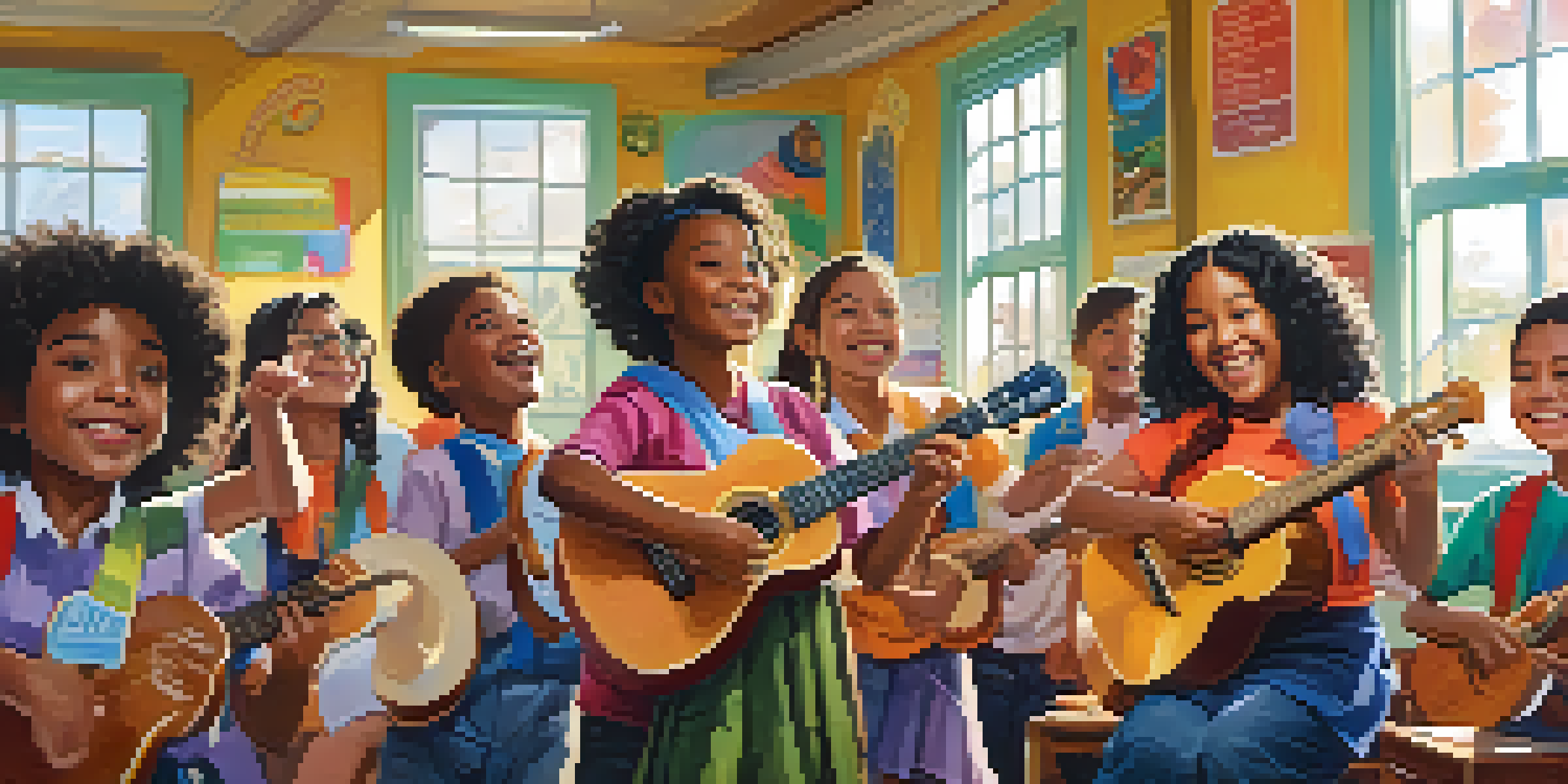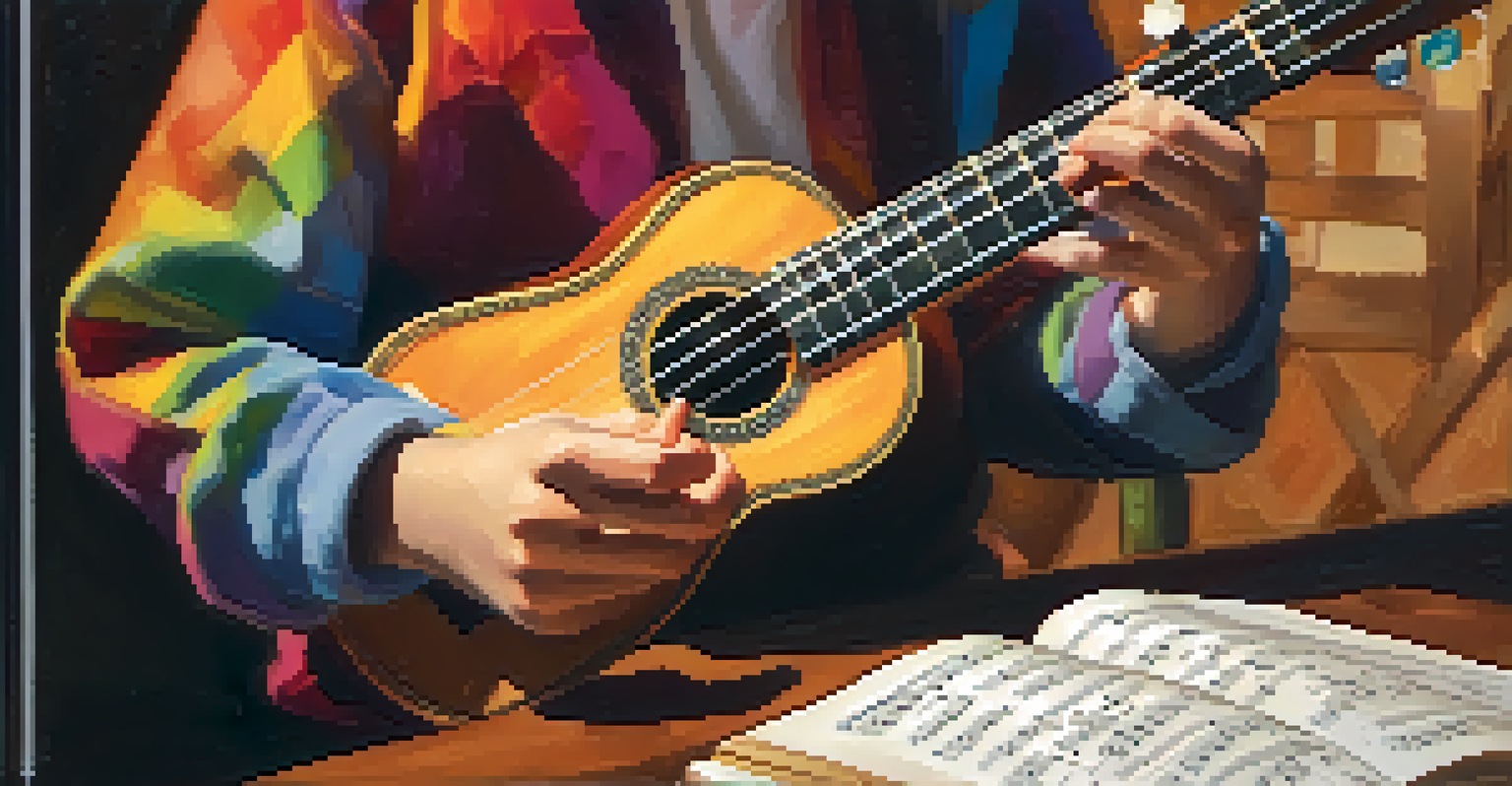Developing Music Literacy with Ukuleles in School Programs

The Importance of Music Literacy in Education
Music literacy is an essential skill that goes beyond just reading notes. It enables students to understand and appreciate music, fostering creativity and cognitive development. By integrating music literacy into school programs, we provide students with a foundation that can enhance their overall educational experience.
Music can change the world because it can change people.
Research shows that music education can improve academic performance in other subjects as well. For instance, learning to read music involves math skills, such as counting and understanding patterns. This crossover reinforces the idea that music literacy is not just about music—it's about building critical thinking skills that are applicable in various areas of life.
Moreover, music literacy fosters emotional expression and social skills. When students learn to perform music together, they develop teamwork and communication skills, making it a valuable addition to any school curriculum.
Why Ukuleles Are Ideal for School Programs
The ukulele is a fantastic instrument for beginners, especially in school settings. Its small size and light weight make it easy for young learners to handle, and the four strings are less intimidating than those of other instruments. This accessibility encourages more students to participate in music programs, boosting overall engagement.

Additionally, the ukulele is relatively affordable compared to other instruments, making it a budget-friendly choice for schools. With a simple investment, schools can provide each student with their own ukulele, fostering a sense of ownership and pride in their musical journey. This accessibility allows for larger class sizes and more opportunities for hands-on learning.
Music Literacy Enhances Education
Integrating music literacy into school programs fosters creativity, cognitive development, and critical thinking skills across various subjects.
Finally, the ukulele's versatility allows students to explore various music genres. From pop and folk to traditional Hawaiian music, students can connect with a wide range of musical styles, which keeps their interest alive and sparks creativity in their musical expression.
Engaging Students with Ukulele Classes
Incorporating ukulele classes into school programs can significantly enhance student engagement. The upbeat nature of the instrument naturally attracts students, making learning fun and interactive. Teachers can create a dynamic classroom environment where students are excited to participate and share their progress.
The beautiful thing about learning is that no one can take it away from you.
Group activities, such as strumming and singing together, can foster a sense of community among students. This collaborative spirit not only makes learning more enjoyable but also builds friendships and social skills that are critical during school years. The shared experience of making music together can lead to lasting bonds.
Furthermore, ukulele classes can be tailored to fit various learning styles. Whether students are auditory, visual, or kinesthetic learners, the ukulele offers a range of teaching methods that can cater to everyone's needs, ensuring that all students feel included and valued in their musical education.
Curriculum Ideas for Ukulele Instruction
When developing a curriculum around the ukulele, it's essential to start with the basics. Teaching students how to hold the instrument, tune it, and play simple chords lays a solid foundation for further learning. Gradually introducing more complex techniques, such as fingerpicking, keeps students motivated as they progress.
Incorporating popular songs that students can relate to can make lessons more engaging. Allowing students to choose pieces they enjoy not only motivates them but also fosters a sense of ownership over their learning. It’s exciting for students to play songs they recognize, which can lead to a deeper connection with the music.
Ukuleles Boost Student Engagement
The ukulele's accessibility and versatility make it an ideal instrument for schools, encouraging student participation and creativity.
Moreover, integrating music theory into ukulele lessons can enhance students' overall music literacy. Teaching concepts such as scales, rhythm, and dynamics through the ukulele provides a practical application of theory, making it more relatable and easier to grasp.
Overcoming Challenges in Ukulele Education
While the ukulele is an excellent instrument for school programs, some challenges may arise. For example, not all students may have prior musical experience, which could cause frustration. However, with a supportive teaching approach and a focus on gradual learning, teachers can help all students find success.
Another potential challenge is maintaining student interest over time. To combat this, teachers can frequently refresh their lesson plans with new songs, techniques, and activities. Regularly introducing variations keeps the classes exciting and encourages students to explore their creativity further.
Additionally, it’s important to address varying skill levels within a classroom. Implementing small group activities or one-on-one sessions can help cater to individual needs, ensuring that each student feels challenged yet supported in their musical journey.
Involving Parents and the Community
Engaging parents and community members in ukulele programs can greatly enhance their effectiveness. Organizing performances where students can showcase their skills allows parents to see the progress their children are making. This support can motivate students to practice and stay committed to their music education.
Community events, such as ukulele clubs or workshops, can also create opportunities for students to connect with local musicians. This exposure can inspire them and provide valuable networking opportunities that may lead to further musical exploration outside of school.
Community Involvement Strengthens Programs
Engaging parents and the community in ukulele education promotes support, motivation, and a lasting appreciation for music among students.
Furthermore, involving parents in the learning process cultivates a home environment that values music education. Encouraging parents to participate in practice sessions or family jam nights can strengthen the bond between families while fostering a love for music at home.
The Long-Term Benefits of Ukulele Education
The benefits of incorporating ukulele education into school programs extend far beyond the classroom. As students develop their music literacy skills, they also enhance their overall cognitive abilities, such as memory, attention, and problem-solving. These skills are transferable to other academic subjects and can contribute to a student's success in school.
Moreover, learning to play the ukulele can instill a sense of discipline and perseverance in students. Regular practice requires dedication, helping students understand the value of hard work and commitment. These character traits can serve them well in their future endeavors, both academically and personally.

Finally, fostering a love for music can lead students to pursue lifelong musical interests. Whether they continue playing the ukulele or explore other instruments, the skills and appreciation they gain can enrich their lives in countless ways, creating a lasting impact that goes well beyond their school years.